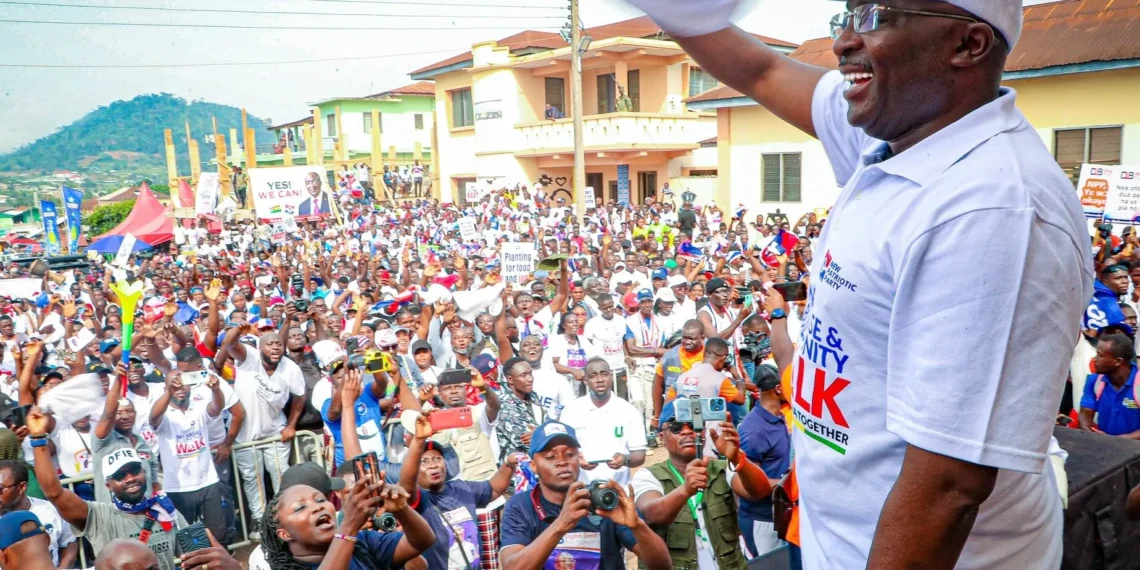The recent electoral loss of the New Patriotic Party (NPP) has ignited a flurry of analyses and speculations across Ghana’s political landscape.
While many attribute the defeat to immediate factors such as candidate unpopularity or short-term policy missteps, a deeper examination reveals a more intricate network of voter dynamics.
In a detailed analysis, Bright Simons, Honorary Vice President of the IMANI Centre for Policy and Education offered a compelling perspective that challenges the conventional narratives surrounding the ruling party’s setback.
“If you are like most Ghanaians, you’ve heard enough about why the NPP lost this year’s elections, etc. One point though has been misconstrued. True that folks like me said more than a year ago, using by-election data, that a significant part of the NPP’s base won’t turn up in the general elections”.
Bright Simons, Honorary Vice President of the IMANI Centre for Policy and Education
According to Bright Simons, the NPP’s base is not monolithic but layered, forming what political scientists term a “winning coalition”. He added that this coalition comprises various tiers of support, each with different levels of commitment and resilience to the party’s appeal.
He pointed out that the outer layers of a political base are particularly susceptible to disassociation when the party’s appeal wanes, implying that these voters, while loyal under favourable conditions, can easily drift away in the face of diminished enthusiasm or changing priorities.
The IMANI’s Honorary Vice President emphasised that while some of these outer-layer voters may switch allegiance to alternative parties, a substantial number simply disengage, eroding the foundational support that parties like the NPP rely upon.
Historical precedents underscore this phenomenon with Bright Simons indicating that the Convention People’s Party (CPP), once a dominant force with a robust base in regions like Ashanti, experienced a dramatic decline post-independence.
He argued that the belief that disenfranchised voters would inevitably return after their grievances were addressed proved disastrously incorrect.
“Many people also forget that it is barely two decades ago that PNC was winning seats in Bolga, Sisala, and Zebila. It has since seen a permanent disassociation of sympathisers. In simple terms, voters left and most never came back.”
Bright Simons, Honorary Vice President of the IMANI Centre for Policy and Education
Beyond Disgruntlement: A Clash of Values
The renowned policy analyst strongly posited that a prevalent but flawed explanation for the NPP’s loss is the notion that disgruntled party members are simply “sulking” over unmet material benefits.
He contended that while economic incentives undeniably influence voter behaviour, attributing a shift of approximately 1.7 million votes—from an initial lead of about 1 million—to mere dissatisfaction oversimplifies the issue.

Bright Simons argued that millions of voters altering their allegiance suggest a more profound realignment of values rather than temporary disenchantment.
This misalignment, he asserted could stem from various factors: evolving societal norms, changes in policy priorities, or a disconnect between the party’s current platform and the electorate’s aspirations.
According to him, when voters no longer identify with a party’s core values, their disengagement becomes a reflection of a broader ideological shift rather than transient frustration.
For Bright Simons, understanding the root causes of electoral shifts is paramount for any political entity aiming to regain lost ground.
He rightly pointed out that recognizing whether voter disengagement stems from value misalignment versus temporary dissatisfaction is crucial.
The former necessitates a strategic overhaul of the party’s foundational principles and policy directions, while the latter might be addressed through targeted constituency services and economic incentives.
Bright Simons emphasized that the danger of misdiagnosis is exemplified by historical outcomes, asserting that assuming that disenfranchised voters will naturally return can lead to complacency, allowing rival parties to consolidate their gains and further fragment the political landscape.
He noted that a precise understanding of voter behaviour dynamics is not just beneficial but essential for crafting effective strategies to rebuild and rejuvenate the party’s base.
The NPP’s recent electoral defeat is a wake-up call that transcends superficial explanations of voter dissatisfaction. As Bright Simons elucidates, the intricate layering of a political base and the potential for permanent dissociation demand a nuanced and strategic response.
Political parties must delve deeper into the evolving values and priorities of their electorate, ensuring that their platforms resonate with the foundational beliefs of their supporters.
It is only through such introspection and adaptation can parties like the New Patriotic Party hope to reconstruct their winning coalitions and secure future electoral victories.
READ ALSO: Greece Joins List Of Countries To Suspend Syrian Asylum Processing





















